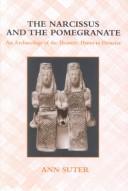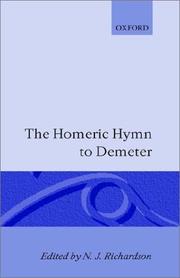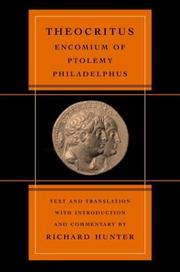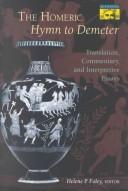| Listing 1 - 10 of 10 |
Sort by
|
Book
ISBN: 9783825365998 3825365999 Year: 2017 Publisher: Heidelberg Universitätsverlag Winter
Abstract | Keywords | Export | Availability | Bookmark
 Loading...
Loading...Choose an application
- Reference Manager
- EndNote
- RefWorks (Direct export to RefWorks)
Hymn to Hermes --- Homeric hymns. --- Homeric hymn to Hermes --- Ὕμνος εἰς Ἑρμῆν --- Εἰς Ἑρμῆν
Book
Abstract | Keywords | Export | Availability | Bookmark
 Loading...
Loading...Choose an application
- Reference Manager
- EndNote
- RefWorks (Direct export to RefWorks)
Hymns, Greek (Classical) --- Poetry, Ancient --- Mythology, Greek --- History and criticism. --- Homeric hymns. --- Hymn to Aphrodite (Homeric hymn 5) --- Hymn to Apollo. --- Hymn to Pan. --- Hymn to Demeter.
Book
ISBN: 9780199589418 0199589410 0191808458 0191057851 9780191057854 Year: 2016 Publisher: Oxford: Oxford university press,
Abstract | Keywords | Export | Availability | Bookmark
 Loading...
Loading...Choose an application
- Reference Manager
- EndNote
- RefWorks (Direct export to RefWorks)
Homeric Epic and its Reception, comprising twelve chapter--some previously published but revised for this collection, and others appearing here in print for the first time--offers literary interpretations of the Iliad, the Odyssey, and the Homeric Hymn to Aphrodite. While some chapters closely study the diction, meter, style, and thematic resonance of particular passages and episodes in the Iliad and the Odyssey, others followdiverse pathways into the interpretation of the epics, including mythological allusion, intertextuality, the metrics of the Homeric hexameter, and the fundamental contrast between divinity and humanity. Also included are two chapters which focus on the work of Milman Parry and Ioannis Kakridis, founders of the two most fruitfultwentieth-century scholarly approaches to Homeric scholarship: the study of the Iliad and the Odyssey as traditional oral formulaic poetry (Parry), and the study of the poems' adaptations and transformations of traditional mythology, folktales, and poetic motifs in accordance with their distinctive themes and poetic purposes (Kakridis). The volume draws to a close with three chapters which discuss some of the most compelling poetic and critical receptions of the Iliad and the Odyssey since thelate nineteenth century, and the institutional reception of the epics in colleges and universities in the United States over the past two centuries. Written over a period of 45 years, this collection reflects the authors long-standing interest in, and scholarly and critical approaches to, theliterary interpretation of Homeric poetry.
Epic poetry, Greek --- History and criticism --- Homer. --- Epic poetry, Greek. --- History and criticism. --- Hymn to Aphrodite (Homeric hymn 5) --- Hymn to Aphrodite. --- Iliad (Homer). --- Odyssey (Homer). --- Hymn to Aphrodite (Homeric hymn 5). --- Homer --- E-books --- Epic poetry, Greek - History and criticism --- Homer - Iliad --- Homer. - Odyssey

ISBN: 047211249X Year: 2002 Publisher: Ann Harbor (Mich.) : The University of Michigan Press,
Abstract | Keywords | Export | Availability | Bookmark
 Loading...
Loading...Choose an application
- Reference Manager
- EndNote
- RefWorks (Direct export to RefWorks)
Demeter (Greek deity) in literature --- Goddesses, Greek, in literature --- Hymns, Greek (Classical) --- -Persephone (Greek deity) in literature --- History and criticism --- Persephone (Greek deity) in literature --- Hymn to Demeter. --- Homeric hymn to Demeter --- Homeric hymns. --- Hymnos eis Dēmētra
Book
ISBN: 9781107012042 9780511997792 110701204X 1108889441 0511997795 Year: 2020 Volume: 62 Publisher: Cambridge: Cambridge university press,
Abstract | Keywords | Export | Availability | Bookmark
 Loading...
Loading...Choose an application
- Reference Manager
- EndNote
- RefWorks (Direct export to RefWorks)
The Homeric Hymn to Hermes is the longest surviving hymn from early Greece, our fullest source for the god Hermes, and an entertaining narrative of theft, invention, cheekiness, and learning to get along. This study contains a new text of the poem, based on advances in our understanding of its transmission, and a commentary which brings together a range of methodologies to address points of linguistic difficulty, poetic technique, and cultural background. The introduction discusses the possible context for the first performance of the hymn, and makes an original argument about the hymnist's remarkable approach to praise and to the epic tradition. This book will therefore be an essential point of reference for students and scholars interested not only in the Hymn to Hermes but in Greek literature and religion.
Hymn to Hermes. --- Hermès --- Homer. --- Hermès. --- Homère. --- Hymne à Hermès. --- Homeric hymns. --- Homeric hymn to Hermes --- Ὕμνος εἰς Ἑρμῆν --- Εἰς Ἑρμῆν

ISBN: 0198141998 Year: 1979 Publisher: Oxford : Clarendon Press,
Abstract | Keywords | Export | Availability | Bookmark
 Loading...
Loading...Choose an application
- Reference Manager
- EndNote
- RefWorks (Direct export to RefWorks)
Homeric hymns --- -Demeter (Greek deity) in literature --- Hymns, Greek (Classical) --- Demeter (Greek deity) in literature. --- Hymn to Demeter. --- Homeric hymns. --- Demeter (Greek deity) in literature --- Demeter (Greek deity) --- Poetry --- History and criticism --- Homeric hymn to Demeter --- Hymnos eis Dēmētra --- Inni omerici --- Homērikoi hymnoi --- Hymni Homerici --- Poetry. --- History and criticism.
Book
ISBN: 9783110259704 9783110259698 3110259699 3110259702 Year: 2013 Publisher: Berlin ; Boston De Gruyter
Abstract | Keywords | Export | Availability | Bookmark
 Loading...
Loading...Choose an application
- Reference Manager
- EndNote
- RefWorks (Direct export to RefWorks)
The Hymn to Hermes, while surely the most amusing of the so-called Homeric Hymns, also presents an array of challenging problems. In just 580 lines, the newborn god invents the lyre and sings a hymn to himself, travels from Cyllene to Pieria to steal Apollo’s cattle, organizes a feast at the river Alpheios where he serves the meat of two of the stolen animals, cunningly defends his innocence, and is finally reconciled to Apollo, to whom he gives the lyre in exchange for the cattle. This book provides the first detailed commentary devoted specifically to this unusual poem since Radermacher’s 1931 edition. The commentary pays special attention to linguistic, philological, and interpretive matters. It is preceded by a detailed introduction that addresses the Hymn’s ideas on poetry and music, the poem’s humour, the Hymn’s relation to other archaic hexameter literature both in thematic and technical aspects, the poem’s reception in later literature, its structure, the issue of its date and place of composition, and the question of its transmission. The critical text, based on F. Càssola’s edition, is equipped with an apparatus of formulaic parallels in archaic hexameter poetry as well as possible verbal echoes in later literature.
Greek poetry --- Poésie grecque --- History and criticism. --- Histoire et critique --- Hymn to Hermes. --- Homeric hymns. --- Hermes (Greek deity) in literature. --- Hymns, Greek (Classical) --- Inni omerici --- Homērikoi hymnoi --- Hymni Homerici --- Homeric hymn to Hermes --- Ὕμνος εἰς Ἑρμῆν --- Εἰς Ἑρμῆν --- Greek. --- Hermes. --- Homeric Hymns. --- Poetry. --- Religion.

ISBN: 0520235606 1282356968 0520929373 9786612356964 1597345962 9780520929371 1417525665 9781417525669 9780520235601 Year: 2003 Volume: 39 Publisher: Berkeley University of California Press
Abstract | Keywords | Export | Availability | Bookmark
 Loading...
Loading...Choose an application
- Reference Manager
- EndNote
- RefWorks (Direct export to RefWorks)
Under Ptolemy II Philadelphus, who ruled Egypt in the middle of the third century B.C.E., Alexandria became the brilliant multicultural capital of the Greek world. Theocritus's poem in praise of Philadelphus-at once a Greek king and an Egyptian pharaoh-is the only extended poetic tribute to this extraordinary ruler that survives. Combining the Greek text, an English translation, a full line-by-line commentary, and extensive introductory studies of the poem's historical and literary context, this volume also offers a wide-ranging and far-reaching consideration of the workings and representation of poetic patronage in the Ptolemaic age. In particular, the book explores the subtle and complex links among Theocritus's poem, modes of praise drawn from both Greek and Egyptian traditions, and the subsequent flowering of Latin poetry in the Augustan age. As the first detailed account of this important poem to show how Theocritus might have drawn on the pharaonic traditions of Egypt as well as earlier Greek poetry, this book affords unique insight into how praise poetry for Ptolemy and his wife may have helped to negotiate the adaptation of Greek culture that changed conditions of the new Hellenistic world. Invaluable for its clear translation and its commentary on genre, dialect, diction, and historical reference in relation to Theocritus's Encomium, the book is also significant for what it reveals about the poem's cultural and social contexts and about Theocritus' devices for addressing his several readerships. COVER IMAGE: The image on the front cover of this book is incorrectly identified on the jacket flap. The correct caption is: Gold Oktadrachm depicting Ptolemy II and Arsinoe (mid-third century BCE; by permission of the Museum of Fine Arts, Boston).
Ptolemy II Philadelphus, King of Egypt --- Theocritus --- Ptolemy --- Ptolemaeus --- Ptolemy II Philadelphus --- Poetry --- LITERARY CRITICISM / Ancient & Classical. --- alexandria. --- ancient egypt. --- ancient greece. --- aristophanes. --- arsinoe ii. --- art. --- augustan poetry. --- classical studies. --- clouds. --- egypt. --- encomium. --- genre studies. --- greek culture. --- greek poetry. --- greek world. --- hellenism. --- hellenistic poetry. --- hellenistic world. --- heracles. --- homeric hymn. --- hymn. --- king. --- latin poetry. --- literary criticism. --- monarchy. --- mythology. --- patronage. --- patrons. --- pharaoh. --- pharaonic traditions. --- philadelphus. --- pithom stele. --- poetic meter. --- poetic tribute. --- poetry. --- poets. --- praise. --- ptolemaic dynasty. --- ptolemy ii. --- reign. --- ruler. --- theocritus. --- third century. --- zeus.
Book
ISBN: 9780199238040 0199238049 9780199639496 0199639493 Year: 2008 Volume: *50 Publisher: Oxford [etc.] Oxford University Press
Abstract | Keywords | Export | Availability | Bookmark
 Loading...
Loading...Choose an application
- Reference Manager
- EndNote
- RefWorks (Direct export to RefWorks)
Hymns, Greek (Classical) --- Aphrodite (Greek deity) --- Aphrodite (Greek deity) in literature. --- Hymnes grecs anciens --- Aphrodite (Divinité grecque) --- Aphrodite (Divinité grecque) dans la littérature --- History and criticism. --- Poetry. --- Histoire et critique --- Poésie --- Hymn to Aphrodite. --- Hymn to Aphrodite (Homeric hymn 5) --- Aphrodite (Divinité grecque) --- Aphrodite (Divinité grecque) dans la littérature --- Poésie --- Aphrodite (Greek deity) in literature --- History and criticism --- Aphrodite --- In literature. --- Homeric hymns. --- Aphrodite - (Greek deity)

ISBN: 0691014795 0691068437 140084908X 9780691014791 1299788459 Year: 1993 Publisher: Princeton (N.J.): Princeton university press,
Abstract | Keywords | Export | Availability | Bookmark
 Loading...
Loading...Choose an application
- Reference Manager
- EndNote
- RefWorks (Direct export to RefWorks)
The Homeric Hymn to Demeter, composed in the late seventh or early sixth century B.C.E., is a key to understanding the psychological and religious world of ancient Greek women. The poem tells how Hades, lord of the underworld, abducted the goddess Persephone and how her grieving mother, Demeter, the goddess of grain, forced the gods to allow Persephone to return to her for part of each year. Helene Foley presents the Greek text and an annotated translation of this poem, together with selected essays that give the reader a rich understanding of the Hymn's structure and artistry, its role in the religious life of the ancient world, and its meaning for the modern world.
Hymns, Greek (Classical) --- Demeter (Greek deity) in literature. --- Eleusinian mysteries in literature. --- Demeter (Greek deity) --- Translations into English. --- History and criticism. --- Poetry. --- Demeter (Greek deity) in literature --- Eleusinian mysteries --- Hymnes grecs anciens --- Eleusis, Mystères d' --- Hymn to Demeter. --- Eleusis, Mystères d' --- Eleusinian mysteries in literature --- Poetry --- History and criticism --- Translations into English --- Homeric hymns --- Homeric hymn to Demeter --- Homeric hymns. --- Hymnos eis Dēmētra --- Inni omerici --- Homērikoi hymnoi --- Hymni Homerici --- Traductions anglaises --- Histoire et critique --- Demeter --- In literature. --- Demetra --- 得墨忒耳 --- デーメーテール --- דמטר --- 데메테르 --- Деметра --- Дэмэтра --- Дэметра --- دمتر --- ديميتر --- Δαμάτηρ --- Δημήτηρ --- Δήμητρα --- Ceres --- Hymns, Greek (Classical) - Translations into English --- Hymns, Greek (Classical) - History and criticism. --- Demeter (Greek deity) - Poetry.
| Listing 1 - 10 of 10 |
Sort by
|

 Search
Search Feedback
Feedback About UniCat
About UniCat  Help
Help News
News